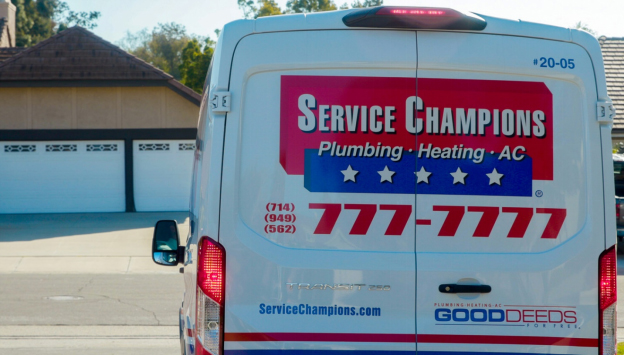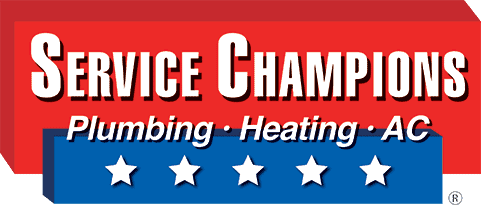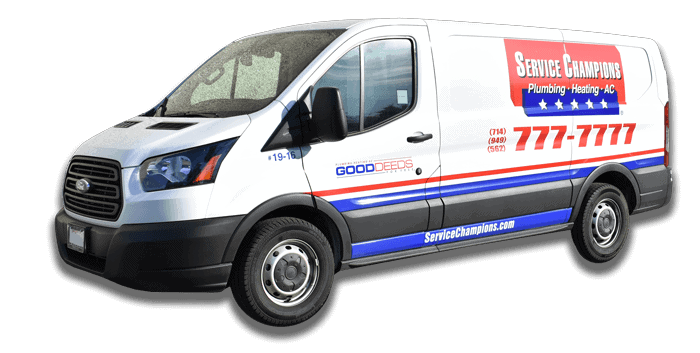Top Common Air Conditioning Problems and How to Fix Them
Your air conditioner is one of the most important systems in your home during the summer. If it breaks down or needs a repair, it’s an uncomfortable problem.
If your AC needs a repair to get your home nice and cool, the pros at Service Champions are ready to help 24/7 with fully stocked, rolling warehouses. With our decades of experience, here are the top common air conditioning problems we’ve come across, how to fix them, and how to know when it’s time to call in the pros.
Top Common Air Conditioning Problems
AC Won’t Turn On
This is the most frequent AC problem most homeowners face. If your AC simply won’t turn it, it can be frustrating, uncomfortable, and difficult to diagnose.
Fortunately, an AC that won’t turn on is often caused by an issue with the circuit breaker. Here’s how you can fix it on your own:
- Check the fuse box to see if the circuit tripped. Your circuit breaker box should have labels for what rooms and appliances each fuse is connected to.
- Never stand in front of the box! Step to the side and turn the correct breaker switch to the “off” position.
- Staying in the same place, turn the switch back to the “on” position.
If the circuit breaker fixes the problem, you don’t have to do anything else. If it doesn’t, you could be dealing with faulty wiring. Do not attempt to fix this on your own if you don’t have electrical experience! Contact a professional to avoid a house fire or serious electrical shock.
AC Cycling On and Off
Another common problem is an AC that cycles on and off constantly, which is known as short cycling. This is not only irritating to experience, but it can damage your AC and compromise your comfort.
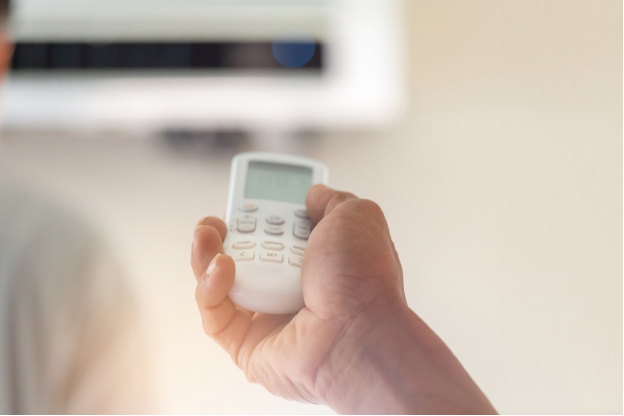
Short cycling may be caused by a clogged condenser unit, evaporator issues, or a dirty air filter. Try cleaning out the air filter first. If that doesn’t work, check the condenser unit for a blockage. Cleaning it out may be enough to fix the problem. If these solutions don’t work, call a professional to inspect your system and identify the problem.
AC Blowing Hot Air
ACs have a simple purpose – blowing cool air. If your air feels warm instead of cool, there could be a problem with your air filter, evaporator, refrigerant, or thermostat, some of which you can fix on your own.
Start by reducing your thermostat temperature by 5 degrees and see if it corrects the problem. If you’re still getting warm air, try cleaning your air filter. Otherwise, you may want to call a professional to check more complex components like the evaporator and refrigerant levels.
AC Is Running Round the Clock
Air conditioning always worker harder and runs longer when it’s hot outside and you want it cool inside, but it needs occasional breaks to avoid overworking and freezing up. Running your AC too much can increase wear and tear and your energy costs.
Try raising your indoor temperature a few degrees to see if your AC turns off. If it does, you could be setting the temperature too low for the heat outside. If it continues to run, the potential problems can include electrical issues, compressor issues, or a malfunctioning thermostat. This is best left to a professional for repair.
No AC Airflow
Your AC’s airflow is a big part of keeping your home cool. If the air is coming out warm – or not coming out at all – there may be an issue with your blower belt, circuit breaker, or refrigerant levels.
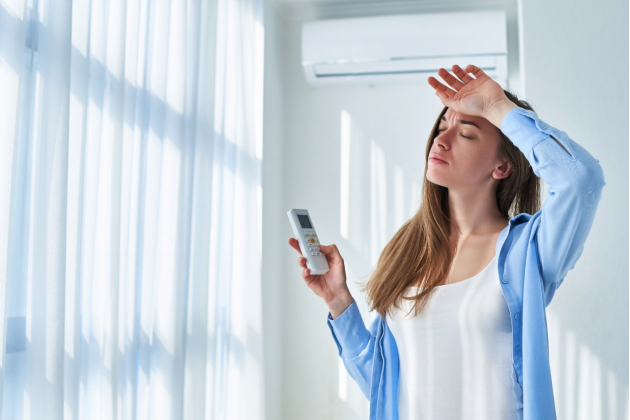
First, check the circuit breaker to see if it tripped. If your AC blows cool air, that’s all you need to do. If not, call a professional AC technician to inspect your unit and check the blower belt and refrigerant levels, neither of which are DIY jobs.
AC Leaks
If an AC leaks, it could be from refrigerant or water. It’s normal to see some condensation, but if you see stains, condensation inside the unit, or water damage on your walls, there may be larger issues to address.
You shouldn’t try to fix refrigerant leaks on your own. This is a serious problem that can damage other components of your AC, including your compressor, and lead to more expensive problems. Call a pro for an inspection and repair.
AC Drain Clogs
Air conditioning units pull moisture from the indoor air, which has to drain somewhere. The condensate moves through a drainpipe to a drain pan, then a drain. If any of these components are clogged with dirt or debris, the water builds up in the unit and can cause damage.
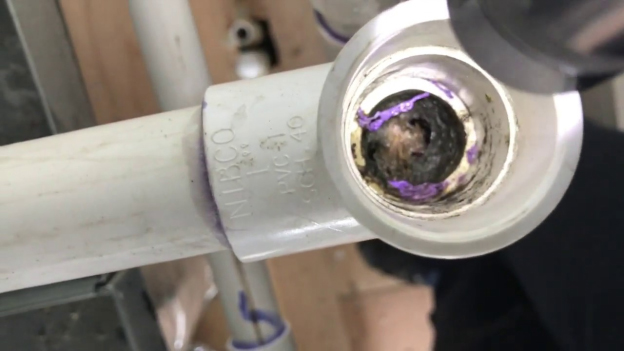
You can fix some clogs on your own. Here’s how:
- Turn off the power to your unit.
- Check the manual to locate the drain pan.
- Pull out the drain pan to find the clog and clean it out.
- Return the pan to the proper place.
If you suspect a clog in the pipes, you can rinse it with water and vinegar to clean it out, then dry it with a clean cloth. Check for damage like cracks as well, which can affect how well your pipes drain condensate.
If these tips fail, call a professional AC technician for an inspection and repair. There could be bigger problems lurking inside your unit that you shouldn’t tackle on your own.
Frozen Condenser Coil
Air conditioners shouldn’t run constantly without the occasional break. Doing so can cause the coil to freeze up, which can damage your unit and increase your utility bills. Frozen coils should be fairly easy to spot and can damage your unit, increase your utility bills, and ruin your home comfort.
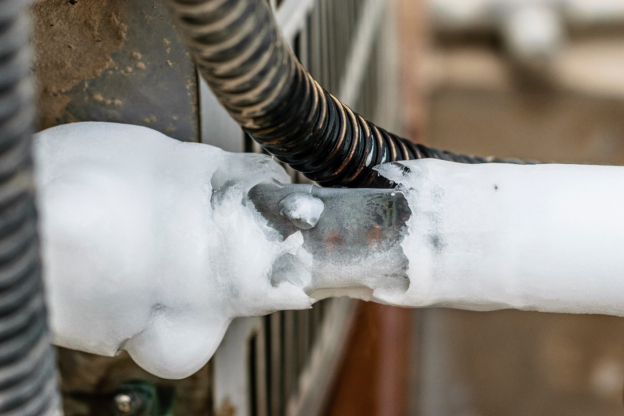
If you run your AC too much, try giving it a break. If you still notice ice buildup, don’t hesitate to call in a professional to inspect your system and make sure all the components are in good condition. It’s not enough to remove the ice – you have to figure out why it’s freezing up in the first place.
AC Odors
Air conditioners may have a smell when you first start them up for the season, but they should go away over time. If there are foul, pungent, or lingering odors, that’s an indication of a problem in your system.
Often, smells come from mold and mildew. You can try changing out your air filter to see if the odor goes away. However, if you still have pungent odors, there could be an issue with a component, fluid leaks, clogs, or other problems. Contact a professional for a thorough inspection.
AC Noises
Air conditioners may make a little bit of noise when they operate, but they shouldn’t be loud or disruptive. If you notice grinding, squealing, squeaking, or other loud sounds that aren’t a quiet fan hum, there may be issues with your motor, belt, or other components.
This is not a task to take on yourself, as you may damage your system or risk injury. Contact a professional AC technician to evaluate your system and identify the cause of the noise. Some problems are too complex for a DIY homeowner to fix.
Thermostat Malfunction
Thermostat malfunctions often show up as other problems, such as an AC that short cycles or inconsistent cooling. If you notice these problems, it may be the thermostat sensors to blame.
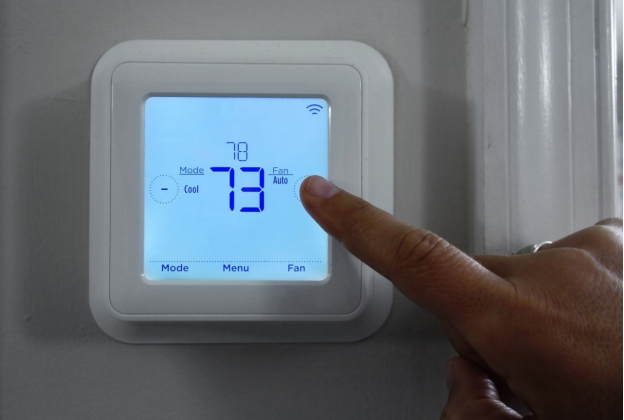
First, check if your thermostat light is on, which indicates the battery is good. You can wipe off the sensors to remove any dirt or debris that may affect its reading of the temperature, and by extension, how it communicates with the AC.
If these quick fixes don’t work, you need to call a professional. Thermostat malfunctions can be complex, so it’s best to leave the work to AC technicians.
Circuit Breaker Tripping
Circuit breakers trip if they’re overloaded or overheated as a safety precaution to avoid an electrical fire. If your AC is tripping the circuit breaker, there are a few potential causes. The air conditioner itself may have faulty electrical wiring, or the circuit breaker could need repair or replacement.
Like other appliances, circuit breakers aren’t meant to last forever. Once your circuit breaker reaches about 25 years old, it may start to develop problems. If your circuit breaker is old, it’s possible that there are too many modern appliances connected to it that it can’t support, so it trips.
The easiest way to test is by resetting the circuit breaker. Wait about 30 minutes for it to restart. If you continue to have problems with the circuit breaker tripping, power it down. Whether the problem is faulty wiring or an issue with the circuit breaker, letting it trip can cause serious damage to your system.
Unless you’re a qualified technician, this is not a task to troubleshoot or repair yourself. Contact a professional to troubleshoot your AC and circuit breaker, identify the problem, and fix it. It’s extremely dangerous to work with electrical systems without adequate tools, training, and experience.
Schedule Repairs for Common AC Problems
If you have an AC problem you can’t fix, Service Champions is always here to help. Contact us today to schedule your appointment!
